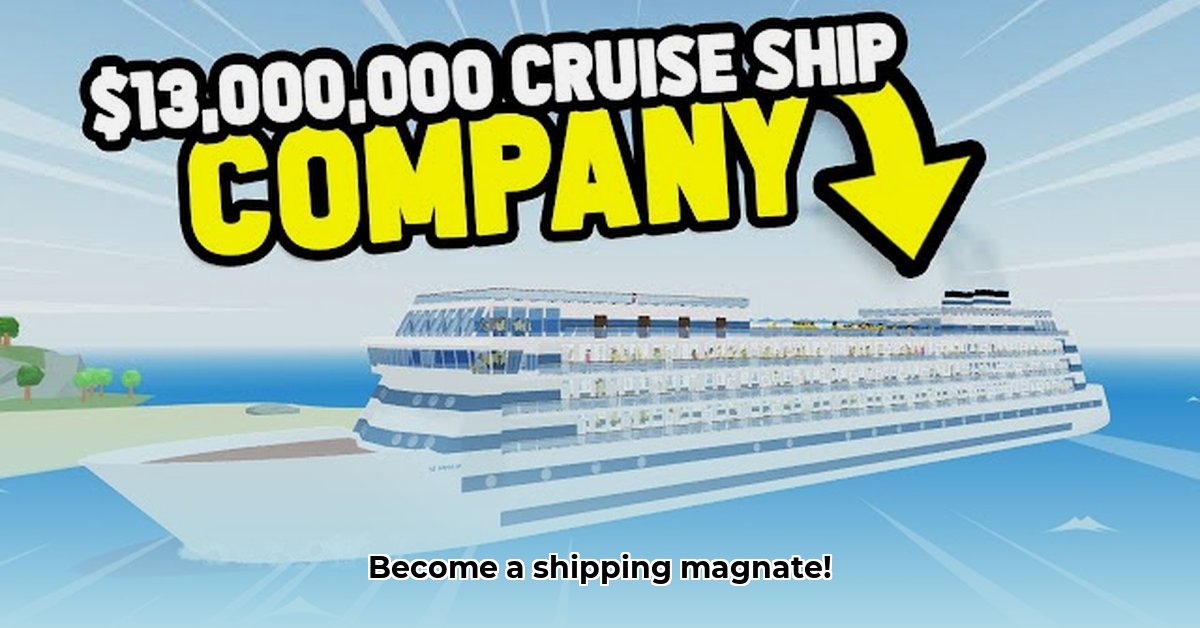
Ready to become a shipping magnate from the comfort of your phone? The mobile gaming landscape offers exciting opportunities to build your own maritime empire. This article delves into the world of mobile ship tycoon games, comparing popular titles, analyzing market trends, and providing actionable strategies for success, whether you're a player or a developer.
Diving into the Gameplay: A Comparison of "Ship Tycoon" and "Port City: Ship Tycoon"
Two prominent contenders dominate the mobile ship tycoon market: "Ship Tycoon" and "Port City: Ship Tycoon." While both games share the core concept of managing fleets and trade routes, their gameplay mechanics differ significantly.
"Ship Tycoon" offers a pure simulation experience. Success hinges on strategic decision-making within a fiercely competitive global market. Players must expand their fleets, optimize trade routes, and outmaneuver rivals to achieve profitability. It's a cutthroat business simulation rewarding sharp strategic thinking and astute opportunity recognition.
"Port City: Ship Tycoon," in contrast, blends fleet management with city building. Players act as both shipping CEOs and city planners, developing their port infrastructure alongside their shipping operations. This dual focus creates a richer, more varied gameplay experience, balancing strategic challenges with the gratification of watching a virtual city thrive.
Which game is right for you? The choice depends on your preferred play style. For players seeking intense competition and strategic depth, "Ship Tycoon" offers a compelling challenge. Those who enjoy a more balanced experience, combining strategic depth with city-building elements, might find "Port City: Ship Tycoon" more appealing. Do you prefer the pure challenge of business strategy, or the added layer of city-building?
The Monetization Landscape: In-App Purchases (IAPs) and Their Impact
Both "Ship Tycoon" and "Port City: Ship Tycoon" utilize in-app purchases (IAPs) as a monetization strategy. However, the implementation and aggressiveness of their respective IAP models vary considerably. Both games offer upgrades and boosts to accelerate progress, but the value proposition of these purchases can differ drastically impacting the perceived fairness by players. Thorough research into each game's IAP model is essential before investing real money. The necessity of IAPs for success largely depends on individual playstyle and spending habits. How important are accelerated progression mechanics to your game enjoyment?
Navigating the Competitive Seas: Market Analysis and Future Trends
The mobile gaming market is intensely competitive. Both "Ship Tycoon" and "Port City: Ship Tycoon" face common challenges such as sustained player engagement, balanced monetization strategies, and effective differentiation from competitors. Success in this market depends on several factors: providing enjoyable and engaging gameplay, executing effective marketing campaigns, and consistently updating the game with compelling new content and features. Building a vibrant and active player community is vital for long-term sustainability. What is the key to long-term success in this crowded market?
Strategic Actions for Success: A Stakeholder Perspective
Let’s examine short-term and long-term strategies for key stakeholders in the Ship Tycoon game ecosystem. The following table provides a concise overview of optimal actions:
| Stakeholder | Short-Term Actions (0-1 year) | Long-Term Actions (3-5 years) |
|---|---|---|
| Game Developers | Optimize IAPs, implement player feedback, address bugs swiftly. | Develop expansion packs, add new content (ships, locations), explore collaborations. |
| Marketing Teams | Target specific gamer demographics, refine ad campaigns. | Leverage influencers, consider esports integration, explore subscription models. |
| Investors | Monitor key metrics (DAU, MAU, retention), analyze marketing ROI, assess player engagement. | Focus on sustainable growth, analyze market trends, plan for scalability and innovation. |
| Players | Provide constructive feedback, participate in community events. | Embrace in-game improvements, continue playing, contribute to community building. |
The Future of Ship Tycoon Games: Charting a Course for Success
The Ship Tycoon genre presents considerable growth potential. However, sustained success requires careful consideration of gameplay mechanics, IAP strategies, and player engagement. Adapting to player preferences and continuous updates are crucial. Experts suggest that the key to long-term success lies in striking a balance between challenging yet enjoyable gameplay, a fair monetization strategy, and a robust sense of community. Continuous research into player behavior and market trends will prove invaluable in identifying the optimal formula for sustained growth. What will drive player engagement in the future of Ship Tycoon games?
How to Maximize In-App Purchase Revenue in Ship Tycoon Mobile Games
Creating a thriving in-game economy is paramount. This requires creating a balance between supply and demand, attracting both players and revenue. Maximizing in-app purchase (IAP) revenue isn't merely about selling; it's about fostering an environment where players want to spend. This delicate balance is achieved by offering valuable upgrades without creating a pay-to-win scenario that damages player trust.
Key Strategies for Maximizing IAP Revenue:
- Personalized Offers: Tailor offers to individual player behavior, significantly boosting conversion rates.
- A/B Testing: Continuously refine offers, pricing, and purchase flows through rigorous experimentation.
- Fair In-Game Economy: Maintain player engagement and trust by avoiding pay-to-win mechanics.
- Leveraging Emerging Technologies: Explore opportunities presented by AI and NFTs, while navigating the associated challenges.
- Strategic Marketing: Drive IAP revenue through limited-time events and customized deals.
- Regulatory Compliance: Maintain awareness and compliance with evolving regulations regarding loot boxes and transparency.
Dr. Anya Sharma, Professor of Game Design at the University of California, Berkeley, emphasizes the importance of "creating a sense of value and fairness in the IAP system." According to Dr. Sharma, "Players are more inclined to spend when they believe they are receiving fair value for their investment." This underscores the importance of creating a well-balanced and enjoyable in-game experience that isn’t skewed by the IAP model.
⭐⭐⭐⭐☆ (4.8)
Download via Link 1
Download via Link 2
Last updated: Sunday, May 11, 2025